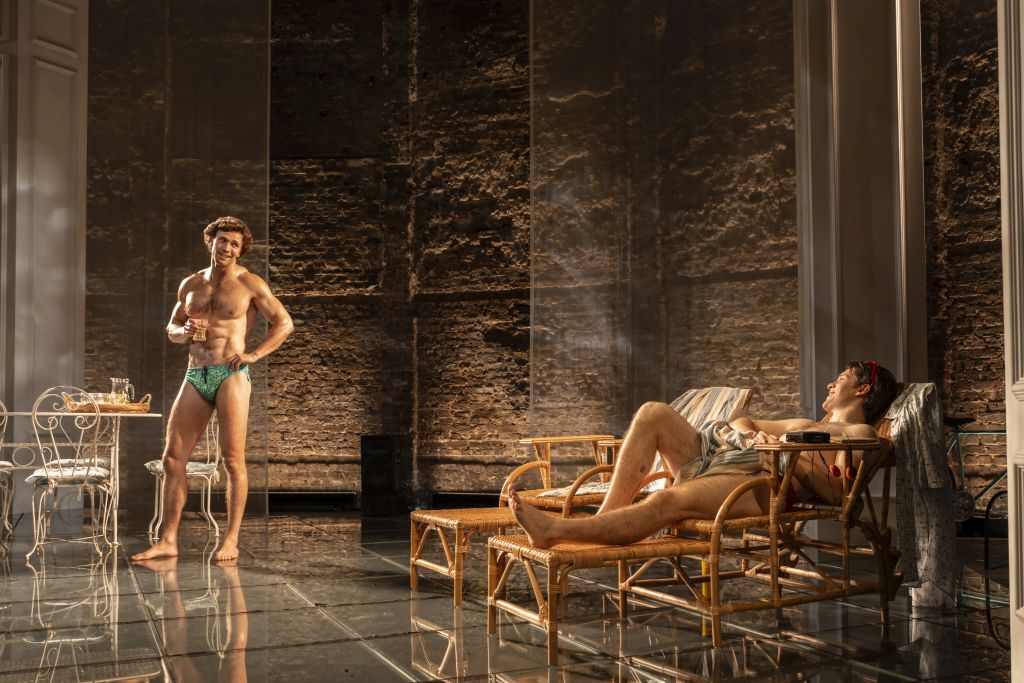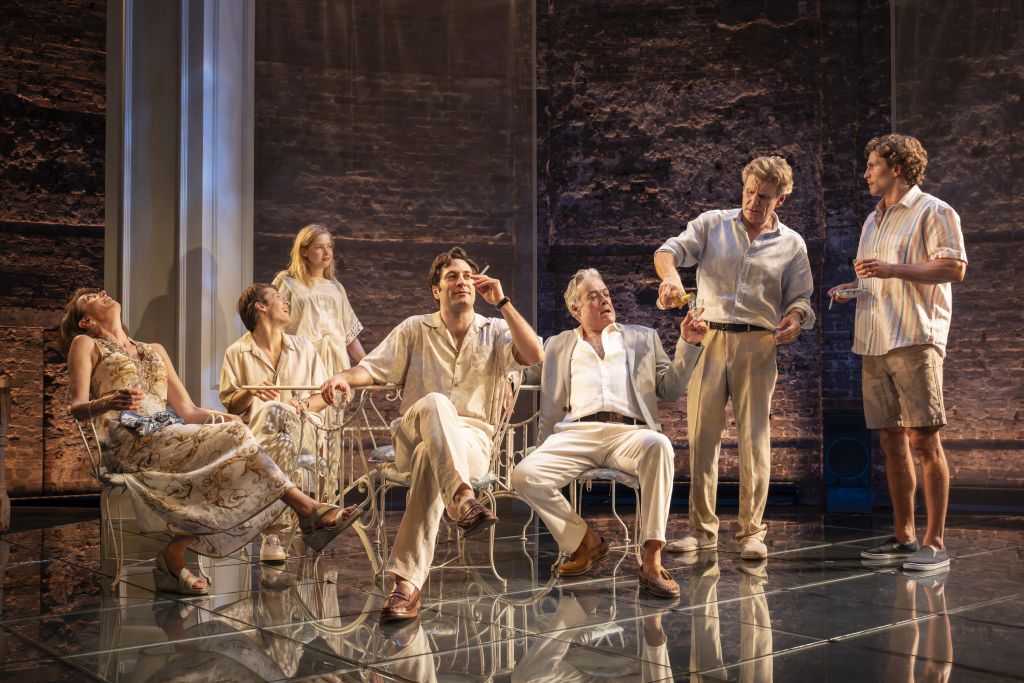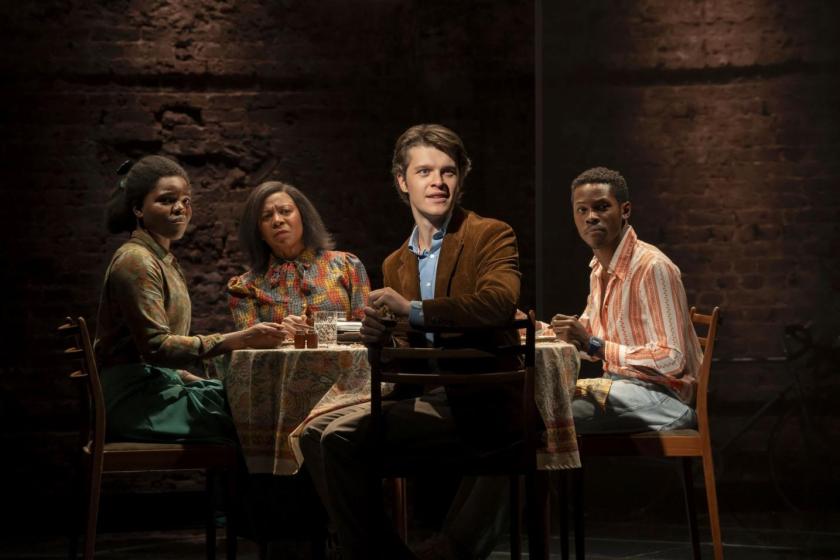Alan Hollinghurst's 2004 novel The Line of Beauty finds a distinct beauty all its own in this long-awaited Almeida Theatre premiere, the play's linearity a decided jolt after the more jagged new writing in which this venue has specialised of late.
Returning to the Almeida for the first time in over 25 years, the director Michael Grandage brings a shimmering melancholy to a theatrical bildungsroman that plunges us headlong into the often terrifying hedonism of the 1980s. Jack Holden's astute adaptation keeps pace with the societal savagery of the novel, but not before reminding us that real things of beauty exist all around us, however bruising life can be.
Previously reimagined in 2006 as a three-part series for the BBC, Hollinghurst's 500-page novel poses a challenge in the theatre, its Jamesian density appropriate to a central character, the Oxford grad Nick Guest (a gently astonishing Jasper Talbot), who is a devotee of James. That same quality sets hurdles for an adaptor confronted with streamlining the book's bustling assemblage of characters while locating a dramatic pathway through the luxuriant passages of observation and introspection that characterise the novel. (There are jokes, too, including one about a Leontyne Price tag.)  Holden, an Olivier nominee for his solo play Cruise, is fully up to the task, as one might expect from the author (and sole actor) of the small-scale tour de force, Kenrex, that gets a further airing next month at The Other Palace. One could imagine Holden himself taking on the part of Nick, though that might be a double assignment too far. It also would have denied Talbot, seen earlier this year as the distraught son in Inter Alia, from furthering his career in the tricky role of a keen-eyed witness to events that more often than not requires Nick to be in reactive mode.
Holden, an Olivier nominee for his solo play Cruise, is fully up to the task, as one might expect from the author (and sole actor) of the small-scale tour de force, Kenrex, that gets a further airing next month at The Other Palace. One could imagine Holden himself taking on the part of Nick, though that might be a double assignment too far. It also would have denied Talbot, seen earlier this year as the distraught son in Inter Alia, from furthering his career in the tricky role of a keen-eyed witness to events that more often than not requires Nick to be in reactive mode.
That Talbot holds his ground, and more, while a sterling supporting cast seize the juicy opportunities the script affords them honours a novel that finds decided excitement, for instance, in the sudden appearance at a party of Mrs Thatcher, only to pull back and reflect on the casual glory that exists in a simple street corner: such pleasures, it's suggested, are as nearly invisible as they are invaluable. Love is far trickier, and it's significant that at two different times, separate characters' admissions of love are not returned.
The keen-eyed Nick gets derided late on as a "chameleon" in an outburst brilliantly managed by Charles Edwards, playing the Tory MP, Gerald Fedden, who rules over the Notting Hill manse into which Nick, an only child, gets absorbed as part of a decidedly dysfunctional family. Toby Fedden (a hyper-ripped Leo Suter, pictured above left, with Talbot), the son, is Nick's best friend from Oxford – a hearty soul who is very much heterosexual and whose 21st birthday is looming at the play's start. The object of Nick's secret desire, Toby has a self-harming sister, Cat (the excellent Ellie Bamber), for whom Nick ends up caring even as her emotionally feckless parents chart their ever-upward societal course. On and off her meds, blunt to enquire of Nick whether he is "a poof", Cat is also the truth-teller of the bunch, who for all her damage sees directly what is going on.
The inter-generational dynamic slides imperceptibly but decisively from bonhomie to something more brutal over the four years on synoptic view. Edwards chills the blood in a tirade in which the Strauss-loving Gerald calls Nick out as "queer", the ruthlessness of the prevailing political elite by that point movingly contrasted with the working-class Leo (Alistair Nwachukwu), whom Nick meets via a classified ad. The first of the various men we see shaping Nick's sexual coming of age, Leo is a Black council worker from a profoundly religious family, and Francesca Amewudah-Rivers and Doreene Blackstock are wonderful as sister and mother, respectively, to a doomed young man whose chosen sexuality isn't easily accommodated within their psyche.
Zelig-like in his ability to adapt to his environs, Nick ricochets from Leo to Wani (the coolly charismatic Arty Froushan, pictured centre below), the entitled coke-snorting Middle Eastern scion of privilege who quizzes Nick on his aesthetic gifts: Hollinghurst's title, as won't surprise you, gets spoken on cue. AIDS provides an initially unspoken backdrop to events, and I, for one, am old enough to shudder remembering a time when, as in the play, talk of a "chesty cough" portended ill.
The early aspect to events of a quasi-comedy of manners extends to the surreal, if fleeting, appearance of Mrs Thatcher, who, as in the novel, is here compared to a country-and-western singer. Hannah Morrish, viewed as Mrs T mostly from behind, deftly juggles three roles throughout the play, including a delicious cameo as an actress-girlfriend of Toby's whose vanity is deliciously stoked in conversation with Nick.  But it's after the interval that the clouds darken, and mortality shadows the apparent ease and frivolity that define the lives before us. Perhaps inevitably, a few plot points give the sense of being dutifully checked off on the way to an ending from which Nick emerges at once chastened and changed.
But it's after the interval that the clouds darken, and mortality shadows the apparent ease and frivolity that define the lives before us. Perhaps inevitably, a few plot points give the sense of being dutifully checked off on the way to an ending from which Nick emerges at once chastened and changed.
That said, it's easy to overlook the lapses into speechifying, given a brilliantly attuned cast that is to both the necessary manners, and the de facto manor, born. Bamber, for starters (briefly outfitted in a party dress to die for), makes of Cat's self-described "pure feeling" a state of being that is surpassingly sad, whilst her opposite number exists in Robert Portal's growly "Badger" Brogan, a Private Eye-reading, moneyed malcontent who these days would surely be working for DOGE. Gerald's habit of calling people "old puss" can't disguise perturbations shared with his none-too-serene wife, Rachel, who is cunningly played by a silken Claudia Harrison.
The designer Christopher Oram frames the action within a classically proportioned frame against which the imperfections of the Almeida's signature back wall remind us of the roughness that can, and here does, accompany privilege: here is one glass house that is easily broken. Throughout it all, the open-faced Talbot searches for an almost Candide-like authenticity amidst financial malfeasance, familial damage, and weakening health. How does one go on? Perhaps, as is suggested by a rending conclusion that takes its cue from the novel, life's actual beauty is there before us, presented without cost or risk. People will surely take the ending in very different ways; I look forward to this production's inevitable transfer to ponder its very real power anew.















Add comment